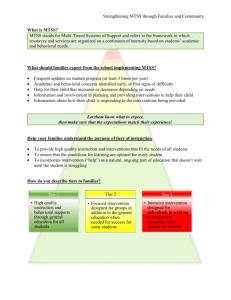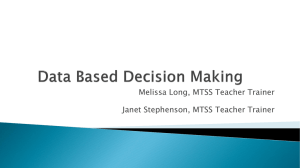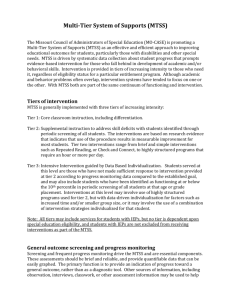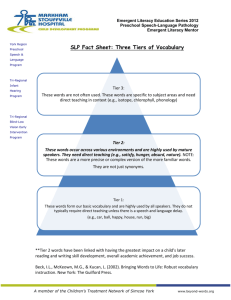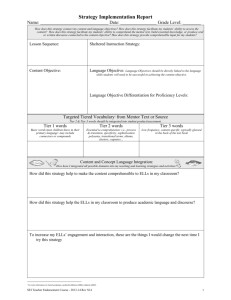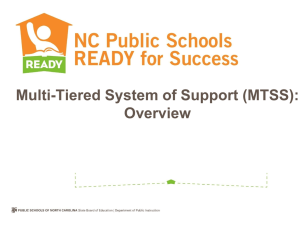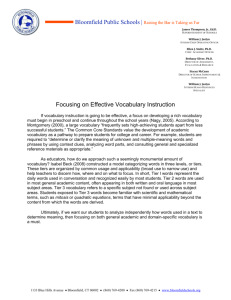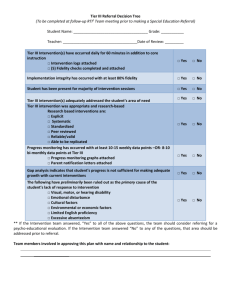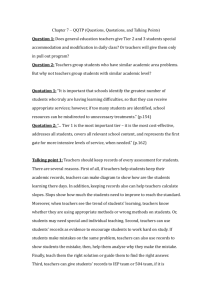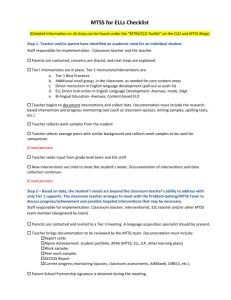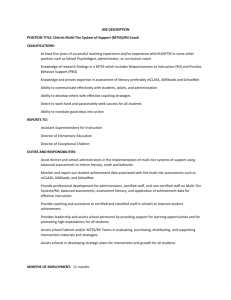File - Professional Work Portfolio
advertisement
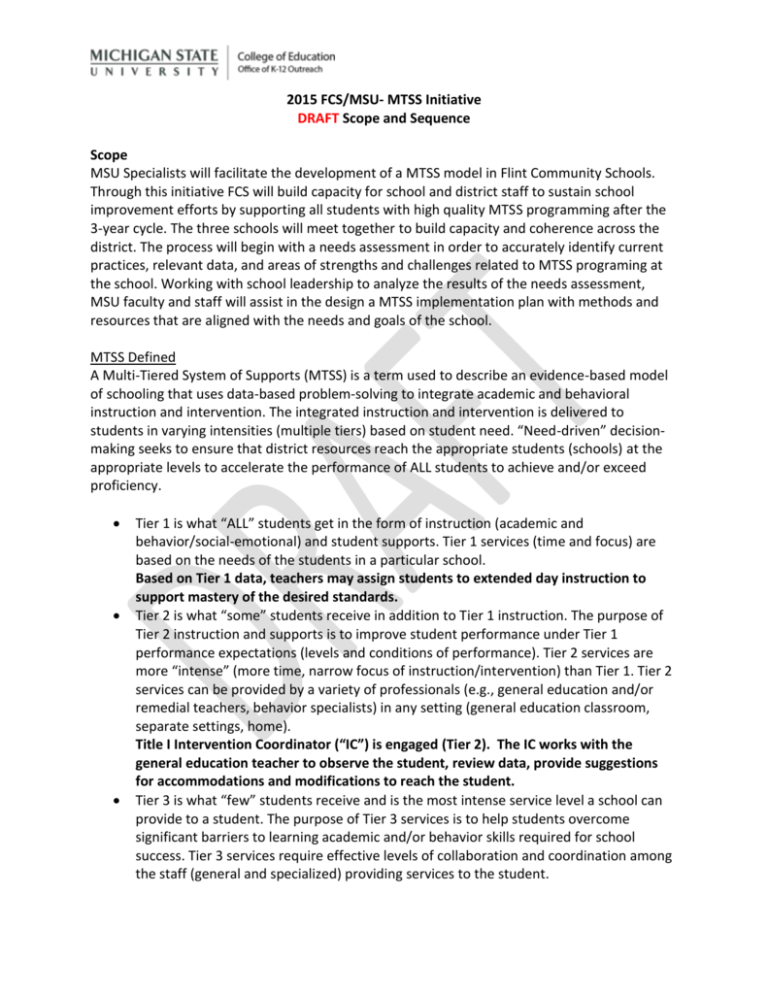
2015 FCS/MSU- MTSS Initiative DRAFT Scope and Sequence Scope MSU Specialists will facilitate the development of a MTSS model in Flint Community Schools. Through this initiative FCS will build capacity for school and district staff to sustain school improvement efforts by supporting all students with high quality MTSS programming after the 3-year cycle. The three schools will meet together to build capacity and coherence across the district. The process will begin with a needs assessment in order to accurately identify current practices, relevant data, and areas of strengths and challenges related to MTSS programing at the school. Working with school leadership to analyze the results of the needs assessment, MSU faculty and staff will assist in the design a MTSS implementation plan with methods and resources that are aligned with the needs and goals of the school. MTSS Defined A Multi-Tiered System of Supports (MTSS) is a term used to describe an evidence-based model of schooling that uses data-based problem-solving to integrate academic and behavioral instruction and intervention. The integrated instruction and intervention is delivered to students in varying intensities (multiple tiers) based on student need. “Need-driven” decisionmaking seeks to ensure that district resources reach the appropriate students (schools) at the appropriate levels to accelerate the performance of ALL students to achieve and/or exceed proficiency. Tier 1 is what “ALL” students get in the form of instruction (academic and behavior/social-emotional) and student supports. Tier 1 services (time and focus) are based on the needs of the students in a particular school. Based on Tier 1 data, teachers may assign students to extended day instruction to support mastery of the desired standards. Tier 2 is what “some” students receive in addition to Tier 1 instruction. The purpose of Tier 2 instruction and supports is to improve student performance under Tier 1 performance expectations (levels and conditions of performance). Tier 2 services are more “intense” (more time, narrow focus of instruction/intervention) than Tier 1. Tier 2 services can be provided by a variety of professionals (e.g., general education and/or remedial teachers, behavior specialists) in any setting (general education classroom, separate settings, home). Title I Intervention Coordinator (“IC”) is engaged (Tier 2). The IC works with the general education teacher to observe the student, review data, provide suggestions for accommodations and modifications to reach the student. Tier 3 is what “few” students receive and is the most intense service level a school can provide to a student. The purpose of Tier 3 services is to help students overcome significant barriers to learning academic and/or behavior skills required for school success. Tier 3 services require effective levels of collaboration and coordination among the staff (general and specialized) providing services to the student. The intervention team led by the IC refers the student to the Educational Support Team (Tier 3). At this time a determination is made to continue intervention programming or enter the student into the formal Response to Intervention (“RTI”) process. The RTI Coordinator develops a schedule to complete observations and review data provided by the IC. Outcomes: The primary function of school and district-level supports for this initiative is to: 1) Ensure that a common-language, common-understanding exists around the rationale for and the purpose and expected outcomes of implementation. 2) Clearly identify who has the responsibility for what and how those individuals will be held accountable. 3) Ensure that district and school policies are supportive of, and not barriers to, the implementation of the model. 4) Provide sufficient support (professional development, technical assistance) to ensure that the implementation plan and timelines can be achieved. 5) Identify clearly the district- and school-level leaders who will have implementation expectations as part of their annual performance reviews. SEQUENCE1 Session 1 Objectives > Outcome 1 Overview of FCS/MSU MTSS Initiative Needs assessment o MSU and FCS schools will discuss current intervention strategies in place in the schools Review of School Transformation Plans o Teams will highlight the big ideas from the transformation plans as they relate to MTSS Shared understanding of relevant data and language for tiered supports o Teams will develop commonality for the purpose of using student data *Homework: As a leadership team, identify strategies and process that address tiered supports Session 2 Objectives > Outcomes 1 & 2 Identifying problem(s) of practice o Teams will work to develop shared understanding of problematic areas 1 Dates to be determined in collaboration with Flint Community Schools 2 Developing a theory of action o Based on the shared understanding, teams will then work to develop a plan for addressing agreed upon challenges *Homework: Teams will gather data of their choice to use during the next meeting to develop skills and capacity to routinely examine and use data to inform instruction Session 3 Objectives > Outcomes 3 & 4 Assumptions about learning o Teams will focus on school culture and expectations for student learning Essential Standards- What do we expect student to learn? o Teams will work to develop a deeper focus on curriculum and connections to mindsets *Homework: Teams will bring in assessment materials used for determining tiers of support. Session 4 Meeting with Principals > Outcome 3 Progress/Assistance Check Professional Learning Community Culture Survey Objectives > Outcomes 3 & 4 Common Assessment Reflections o Teams will develop shared understanding about the role of assessment in MTSS Universal Screening Planning Guide o Teams will analyze the processes in place for screening student needs *Homework: Teams will identify resources and supports aimed at tiered interventions Session 5 Objectives > Outcome 4 Student self-tracking o Teams will develop strategies for increasing student awareness of academic progress Resources and supports o Teams will analyze time, money, and people that are directed to support MTSS Session 6 Objectives > Outcomes 4 & 5 Components vs. Outcomes of Professional Support (AM) 3 o Teams will learn and strategize how their team can effectively support instruction within their school Teams will develop a plan of action for Next School Year (PM) o To ensure work continues next year, teams will develop a plan to Fall implementation Deliverables Year 1, MSU Specialists will Perform a needs assessment to begin planning for the MTSS process Provide access to the latest, best practices, strategies and resources for MTSS Develop a professional learning community and a culture of sustainability Use the school improvement plan and multiple forms of student data to identifying an appropriate problem of practice and theory of action in order to provide aligned content and MTSS structures for targeted skill development Focus school-community efforts including a shared understanding of the needs, available resources and applicable strategies Develop a shared understanding and application of relevant data for the purpose of providing “tiered” interventions Identify effective organizational structures that support an adaptive MTSS-RTI system based on student needs. 4
